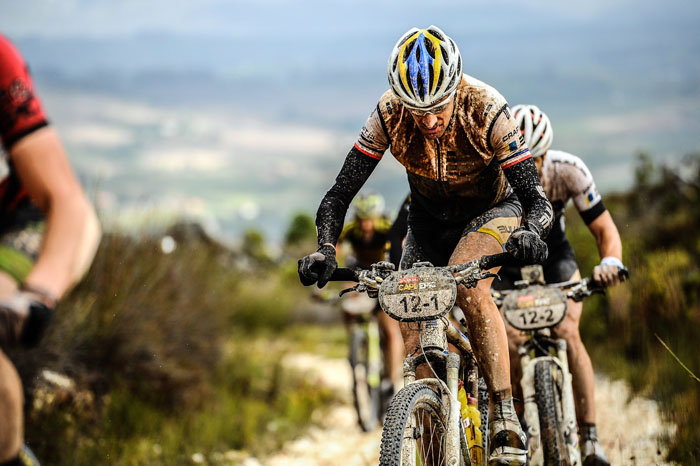Most mountain bikers will participate in a marathon event, or at the very least a challenging marathon ride, at least once. Marathons usually take four or more hours to complete, and the physical test of pushing the body for that long is surpassed only by the mental challenge of staying focused, positive, and coping with setbacks.
Here are MarathonMTB’s top tips for keeping on top of the mental game for the long haul:
Do a practice run
So this sounds more like physical preparation, sure, but going into an XCM event is a whole lot easier if you know you can cut it physically. Our advice is to build up your distances in training – say with a long ride once a fortnight or so – until you have done a similar route to your event at least a fortnight before it comes up. This doesn’t just mean nailing the distance – look at how much climbing and estimate how much time on the bike to expect as well… A 100km ride with 1000m of climbing feels a whole lot different from 100km with 2700m of up.
Remember to train for the hills as well as the distance
If you’re short on time or conditioning and don’t have the luxury of gradually building your training, aim to do 60-75% of the event distance and climbing in one go (for an individual XCM).
Once you’ve got this dress rehearsal in the legs, no matter how much your mid-event brain tells you that you’re not going to make it, that you can’t do it, you’ll always know that actually, you can. Because you have. Even the most panicked, errant race brain is going to have to accept that, and move on. If you’re doing a dress rehearsal ride, a great tip is to also use this to practice with your nutrition, hydration, and importantly, pacing as well – never go out too hard.
Use distraction
At some point, and possibly the whole way through, a marathon is going to hurt. Sometimes lots. Most riders find themselves starting to struggle between the second and third hours, and some experience heart-breakingly epic lows. Go into your event with the same mindset you’d adopt if you were taking a toddler on a long-haul fight: armed with a bag of treats, distractions, activities, and bargaining tools to try to keep the tantrums to a minimum, all the while acknowledging that tantrums are inevitable.
Everyone hurts – it’s how you deal with it that counts. Nino Schurter suffers in stage 1 of the 2014 Cape Epic. Photo by Greg Beadle/Cape Epic/SPORTZPICS
When your mind starts to play up and tell you this is too hard, a waste of time, no fun whatsoever, and not worth it, reach into your bag of distractions and pull something out. Sometimes singing an upbeat song in your head will help (I’ve known some to pull out the headphones when the going gets tough – check it’s allowed in your event), a bunch of mantras like ‘I can do this’, ‘this is tough but worth it’, ‘fit and strong’, etc.
Distractions help a lot – the kind of mindful riding that gets you in the zone and out of anguish – notice the scenery. Chat to a fellow rider. Think about how different parts of your body are feeling – even if they’re hurting – and examine that feeling in detail… sooner or later your mind will move on to more useful, helpful things. Epic lows are temporary.
At the very worst, count. Count pedal strokes up to 100, then (you guessed it), start again.
Stay flexible
By far some of the hardest mental anguish is going to arise when you’re not on track to get the result, or achieve the goal, that you were after. Maybe you wanted to come in under a certain time. Maybe you wanted to beat one of your riding buddies. Maybe you were aiming for a spot on the podium. When you’ve got the momentum of a goal behind you, your brain will typically play nice: motivation is high and the rewards of seeing your achievement getting close roll along with you.
But if your goal slips away – say your mate leaves you for dust, you get a flat, or you just have heavy legs on race day – keeping positive enough to finish and keep the pressure on so you’re still up with a shot is going to be hard. The best way to cope with this is to prepare.
Do your best to minimise risk of incidents by having your bike prepped and plenty of water and food planned. Then don’t just go in with a goal – go in with a plan B, a plan C, and a worst-case-scenario plan so you can still creep home, even if you’re in pieces. Bike racing is unpredictable – we at MarathonMTB like aim to expect at least one significant-unpleasant-surprise per race – and you can too.
Make a plan for dealing with the unexpected
Break a marathon up
100km, five hours, whatever it is, a marathon is loooong, and when you’re enduring maximal pain but realise you still have 60 per cent of the event to go, it’s going to feel a tad overwhelming. Break the race up into a bunch of milestones so your brain doesn’t explode with the obscene reality of what you’ve signed up for. Feedzones, significant hills or descents, laps, and distances are good ways to mark your progress. Celebrate with a mental fist pump every time you reach your chosen milestones.
If all else fails: patience
Everything passes. foul moods, pain, disappointment, an awful section of track. Sometimes it’s enough just to wait for the next mood, piece of trail, or rider who comes along. Acknowledge your thoughts and feelings and leave them there, eventually they will pass and something better might replace them. Eventually, the finish line will come into view.
Good luck with your next marathon! Remember to stay hydrated and fed, pace yourself sensibly, and never push through an injury that will do you damage in the long run. Check out our calendar for upcoming XCM events.

